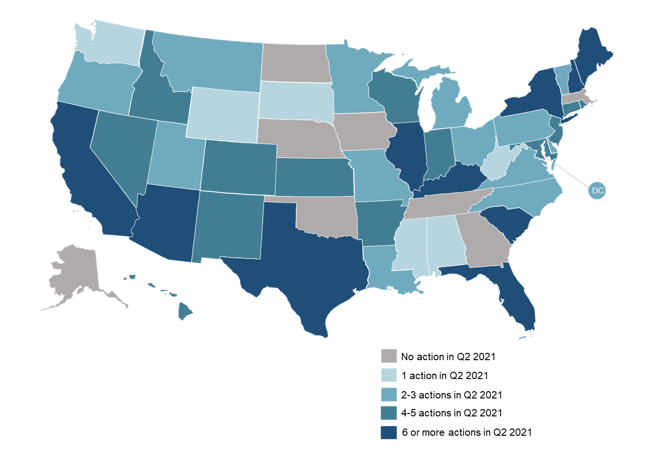The 50 States of Solar: States Consider Time-Varying Rates and Battery Storage in Net Metering Tariff Design in Q2 2021
Raleigh, NC – (July 21, 2021) The N.C. Clean Energy Technology Center (NCCETC) released its Q2 2021 edition of The 50 States of Solar. The quarterly series provides insights on state regulatory and legislative discussions and actions on distributed solar policy, with a focus on net metering, distributed solar valuation, community solar, residential fixed charges, residential demand and solar charges, third-party ownership, and utility-led rooftop solar programs.
The report finds that 42 states, plus the District of Columbia, took some type of distributed solar policy action during Q2 2021 (see figure below), with the greatest number of actions continuing to address net metering policies (60), community solar policies (38), and residential fixed charge or minimum bill increases (30). A total of 179 distributed solar policy actions were taken during Q2 2021, with the greatest number of actions taken in California, Maine, South Carolina, New York, Illinois, and Texas.
Q2 2021 Policy Action on Net Metering, Rate Design, and Solar Ownership

The report identifies three trends in solar policy activity taken in Q2 2021: (1) regulators evaluating time-varying credit rates for net metering customers, (2) utilities designing distributed generation programs with energy storage in mind, and (3) states continuing to focus on community solar for low-income customers.
“Conversations concerning the future of customer generation are growing increasingly sophisticated with states from California to South Carolina looking for ways to incorporate energy storage and utilize time-of-use rates, ” said Brian Lips, Senior Policy Project Manager at NCCETC.
The report notes the top five distributed solar policy actions of Q2 2021:
- South Carolina regulators approving solar choice metering tariff designs;
- The Kentucky Public Service Commission issuing a decision on Kentucky Power’s net metering proposal;
- Hawaii’s HECO utilities proposing new distributed energy resource programs;
- Sacramento Municipal Utility District proposing a net metering successor tariff in California; and
- Pedernales Electric Cooperative in Texas considering major net metering changes.
“We’re seeing a lot of states starting to take a more holistic view to distributed energy resource policy and tariff design, considering how different technologies interact and what the overall impact on the customer and the grid is,” observed Autumn Proudlove, lead author of the report and Senior Policy Program Director at NCCETC.
View the 50 States of Solar 2021 Q2 Update Executive Summary
View and Purchase the 50 States of Solar 2021 Q2 Update FULL Report
View other 50 States Reports – Solar, Grid Modernization and Electric Vehicles
ABOUT THE N.C. CLEAN ENERGY TECHNOLOGY CENTER
The N.C. Clean Energy Technology Center, as part of the College of Engineering at North Carolina State University, advances a sustainable energy economy by educating, demonstrating and providing support for clean energy technologies, practices and policies. It serves as a resource for innovative, sustainable energy technologies through technology demonstration, technical assistance, outreach and training. For more information about the Center, visit: http://www.nccleantech.